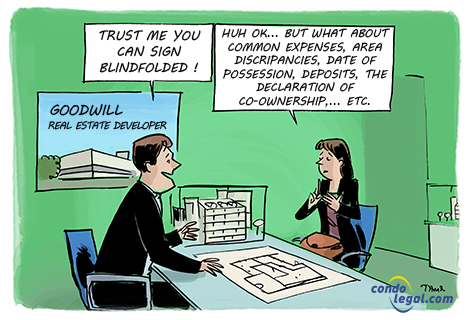 An offer to purchase, also known as a promise to purchase, precedes any transaction relating to an existing property, as opposed to new or to be build condos, which are accompanied by a preliminary contract. The initiative of an offer to purchase is taken by a potential buyer, who will establish the conditions for the acquisition of a property. Although this document is not mandatory, legally speaking, it represents a mandatory passage for most buyers. Generally recorded in writing, the offer to purchase shows the willingness of the future purchaser to engage in the transaction. It is also a first step that leads to the deed of sale.
An offer to purchase, also known as a promise to purchase, precedes any transaction relating to an existing property, as opposed to new or to be build condos, which are accompanied by a preliminary contract. The initiative of an offer to purchase is taken by a potential buyer, who will establish the conditions for the acquisition of a property. Although this document is not mandatory, legally speaking, it represents a mandatory passage for most buyers. Generally recorded in writing, the offer to purchase shows the willingness of the future purchaser to engage in the transaction. It is also a first step that leads to the deed of sale.
Object
The offer to purchase makes it possible to retain a property under certain conditions set by the potential buyer who, therefore, formally undertakes to buy the property from the seller. However, this transaction will be conditional on its acceptance of the terms and conditions. This offer to purchase must therefore be drafted in accordance with the rules of the art. In addition, it must include a few mentions and suspensive conditions aimed at protecting the buyer.
The offer to purchase is usually formalized through a real-estate broker. When this is done through a real-estate broker, the offer to purchase must be in writing and be recorded using a mandatory form from the Organisme d'autoréglementation du courtage immobilier du Québec (OACIQ). Furthermore, it must be considered as a prior-contract. Its objective: to reflect the willingness of the future buyer to buy in the building concerned, and at the price indicated, while specifying the guidelines to the transaction. This prior-contract binds the seller, in the event of his acceptance of the various terms contained in this document. He will then be prohibited from selling his immovable to any other purchaser. For his part, the future buyer will be obliged to acquire the property at the price set in the offer to purchase.
Rights and obligations of the seller
The seller is entitled to receive and analyze all offers to purchase submitted for his building. He is entirely free to answer them (or not), and in the order he pleases. During the period of validity of an offer to purchase, the seller may:
If the seller accepts the terms of the offer, the prospective buyer is automatically engaged in the transaction. According to the Civil Code of Quebec, " The promise of sale with delivery and actual possession is equivalent to sale ". Consequences: if the seller accepts the proposed price, in writing, the sale is theoretically concluded legally. The deed of sale must therefore be signed.
Rights and obligations of the buyer
If the seller hesitates to follow up on the offer to purchase, even though he had already accepted it unconditionally, the buyer may ask him to respect his commitment and sign the deed of sale. Failing to do so, he will be able to obtain a judgment that will ensure that the title of the seller is transferred to him. The conditions for the exercise of a judicial remedy for the transfer of title are as follows:
On the other hand, the buyer can retract, in the event that the seller refuses the offer or makes a counter-proposal. In this case, the initial purchase offer becomes null and void and the buyer is thus released from any commitment. If the offer to purchase specifies a duration, and the seller has not accepted the proposal within the time limit, the buyer will also regain his freedom. In the absence of mention, it can theoretically retract at any time, as long as the seller has not responded favorably to the offer.
Claim for damages
The failure of one of the parties to honor an accepted offer to purchase could engage its civil liability. If that was the case, it would have to pay damages to the injured party, which would cover the moral or material damage suffered. That financial compensation would compensate for the payment of the notary's fees, the remuneration of the real estate agency or real estate broker, the time spent looking for and obtaining a mortgage; loss of profit; inconveniences related to the move, or even costs paid to keep the building until the sale is concluded.
 WHAT YOU SHOULD KNOW! An experienced real estate broker in condominiums will avoid several problems for the buyer and seller. His mastery of the legal documents relating to the transaction, as well as the issues specific to the legal regime of divided co-ownership will be beneficial to them.
WHAT YOU SHOULD KNOW! An experienced real estate broker in condominiums will avoid several problems for the buyer and seller. His mastery of the legal documents relating to the transaction, as well as the issues specific to the legal regime of divided co-ownership will be beneficial to them.
 WHAT TO KEEP IN MIND: By reason of its enforceability, the accepted offer to purchase should not be treated as a mere formality. For both the promisor-buyer and the promisor-seller, a valid and accepted promise to purchase on both sides must be respected and a deed of sale must follow.
WHAT TO KEEP IN MIND: By reason of its enforceability, the accepted offer to purchase should not be treated as a mere formality. For both the promisor-buyer and the promisor-seller, a valid and accepted promise to purchase on both sides must be respected and a deed of sale must follow.
 WARNING! Not to abide to an offer to purchase can be an expensive mistake, either for the promising vendor or the promising purchaser. Damages can be claimed, if one or the other party defaults. The plaintiff can also ask the Court for a judgment equivalent to a deed of sale.
WARNING! Not to abide to an offer to purchase can be an expensive mistake, either for the promising vendor or the promising purchaser. Damages can be claimed, if one or the other party defaults. The plaintiff can also ask the Court for a judgment equivalent to a deed of sale.
Return to the super file Offer to Purchase


